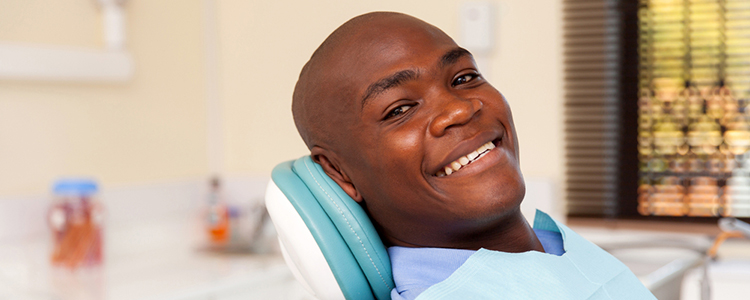How to Prevent Cavities
It may seem strange to suddenly be having these problems again, but in fact it is very common for you to experience cavities again as you get older. They don’t just affect children! Children and seniors are the two highest at-risk groups for tooth decay.
One common cause of cavities for older Americans is dry mouth, which is often a side-effect of medications for blood pressure, cholesterol, allergies and more. So how can you prevent this?
First, you should speak with your dentist about any medications you are taking and get their input. Here are some other tips for keeping your teeth healthy:
- Keep your diet low in sugar
- Drink more water
- Add more calcium to your diet
- Make sure you’re getting enough fluoride – try using fluoride toothpastes or mouth rinses
With these tips and regular cleanings, you can keep your teeth healthy. Scheduling regular cleanings (2 each year are recommended) can help your dentist catch and treat the early stages of cavities or other issues before it becomes more serious.


Are you suddenly getting cavities after years of being cavity-free?
How Not to Get a Cold or Flu this Season
“Many different germs can survive on surfaces,” says Tom Talbot, M.D., chief hospital epidemiologist at Vanderbilt University Medical Center in Nashville, Tenn.
Touching a spot that has been contaminated by germs — at home, at work, or just about anywhere else — puts you at risk of infection if you later touch your mouth, nose, or eyes, all areas that allow microbes to enter your body.
Washing your hands — the right way and at the right time — eliminates the germs before they can gain access and make you sick. Here, advice from the experts:
When to Wash
Always wash your hands after you use the bathroom, before you eat food, and anytime your hands are visibly dirty, says Janet Haas, Ph.D., R.N., director of epidemiology at Lenox Hill Hospital in New York and president-elect of the Association for Professionals in Infection Control and Epidemiology. It’s easy to pick up or transmit germs in all three of these instances.
“People should also consider cleaning their hands after they’ve been on public transportation,” she adds.
Make sure kids wash their hands when they come into the house after playing outside. And the Centers for Disease Control and Prevention also recommends that you wash your hands after touching animals.
And if you’re sick with a respiratory infection, such as the common cold or the flu, you may want to clean your hands more often than usual, Haas says, because if you’re coughing and sneezing, you could be contaminating your hands and spreading the bug to others.
How to Encourage Your Doctor to Wash
While hand hygiene is always important, it’s essential if you’re in the hospital, where severe and sometimes antibiotic-resistant infections can lurk.
“Hospital personnel not only can transmit infections but also can get sick themselves,” says Orly Avitzur, M.D., Consumer Reports’ medical director. “So we all know that we should wash our hands before and after attending to every patient.”
But research shows that doesn’t always happen. According to the CDC and assorted studies, some providers clean their hands as little as half as often as they should.
If you are hospitalized or caring for someone who is, and notice that a healthcare provider hasn’t washed up when entering your room, speak up.
To make this conversation feel less daunting, Avitzur recommends taking note of any signs posted about hand-washing in the hospital and using that as a way to start the conversation.
Avitzur suggests saying—or asking a family member to say—something like, “I was so pleased to see that your hospital has a hand-washing policy. Have you washed your hands?”
In addition, remind visitors to wash their hands when they enter and leave your room. And if you’re the patient, be sure to keep up with your hand hygiene. Ask for help washing your hands before a meal, or request a bottle of alcohol-based hand sanitizer.
The Best Way to Wash
Generally, washing with soap and water is the most effective method for reducing the number of germs on your hands.
Plain soap is best—skip antibacterial products because there’s no evidence they work any better than regular soap, and they may encourage the breeding of bacteria that can’t be cured by antibiotics.
If you have no access to soap and water, using a hand sanitizer made with at least 60 percent alcohol is the next best option. But hand sanitizers won’t eliminate all kinds of germs, according to the CDC.
For example, they’re ineffective against Clostridium difficile (C. diff), a hard-to-cure diarrheal infection that’s common in hospitals. So if you have this infection, you (and your care team and visitors) will need to wash with soap and water.
Copyright© 2006-2017 Consumers Union of U.S., Inc. No reproduction, in whole or part, without written permission.


You can do plenty to help prevent the spread of viral and bacterial infections, such as getting a flu shot and staying home from work or school if you get sick.
But one of the most important steps is also one of the simplest: washing your hands regularly.
Tips on Dental Care When You’re on Vacation
When you take a vacation, make sure you don’t check out completely. Just because you are taking a break from the everyday doesn’t mean you can ignore your daily dental routine! When you go on vacation there are a few things to keep in mind.
When you pack, make sure you pack enough to keep your daily routine the same. A 3.4-ounce travel size toothpaste will provide 10 brushings per tube. With that number you can adjust and decide how much you should bring on your trip. The same goes for mouthwash and floss — make sure you bring them in order to maintain your normal routine!
Another important aspect to look at is the toothbrush you will be bringing with you on your trip. Some of the travel brushes on the market today have a major flaw. The lack of a long handle makes it difficult to get to the back molars in your mouth, leaving patches that have been avoided. Make sure when you shop for toothbrushes you keep in mind that it’s for travel. There is no need to spend excess amounts of money on an expensive, high-end toothbrush you are only going to use for a few days out of the year. It is better to put that money in your home toothbrush to make sure you are getting the most out of it.
One thing that can be taken out of your regular schedule is your teeth whitening. Keeping up with your overall dental health is much more important than continuing an at-home whitening schedule. There are some mobile teeth whitening kits that are available. However, they tend to be very expensive and quite bulky to carry around. If you are going on a short trip it is probably worth passing on the whitening.
When you travel you tend to snack much more often. When you are snacking on the go, make sure that you try to choose healthy treats instead of all the chocolate and sugar that is floating around airports. Apples and other fruits are a good choice if you can find them. Some of the best alternatives are pretzels and crackers because they promote a healthy thirst. The key is make sure to quench that thirst with water, not sugary soda and juices! The water will naturally help clean and rinse your teeth, helping reduce plaque buildup and keep away nasty stains.
Wherever you go, make sure you keep your dental health on your mind. This will help you remember to brush, drink lots of water and stay away from detrimental foods! No matter where your travels take you, make sure to keep up with your daily dental routine!

We encourage you to never underestimate the impact your dental health has on overall health and well-being, and we hope you’ll take advantage of significant savings on the care of your mouth, teeth and gums with the Union Plus Dental Discounts program.
The Health Benefits of Flowers from Teleflora
Most people enjoy flowers in any way, shape, or form they can get them. Aside from being pretty, plants have many benefits for a person’s overall health and well-being. Summer is a great time for change, so why not spruce up for house or office with a few more plants. Here are just a few health benefits of having fresh-cut flowers part of your everyday life:
Emotional Health Improvement
Receiving flowers, whether they are sent from another person or you bought them for yourself, can give you an immediate mood boost. A bouquet of flowers is a sign that someone cares for you, and being well-thought of can do a lot for a person’s well-being. A pretty flower bouquet with bright colors and a soothing scent can brighten a room and your mood at the same time.
Aid in Memory and Concentration
Many people have a moment where they completely lose their train of thought. Keeping plants in indoor spaces may help with concentration and memory; plants oxygenate the air, boosting your brain cells and making you feel more like your best self. You can opt for a bouquet, or go for a longer-lasting plant, such as Teleflora’s Peaceful Zen Garden, a combination of bamboo and easy-to-care-for succulents in a brown bamboo container. These plants only need water once a week and grow quickly, making them entertaining, as well as good for supercharging your brain.
Aid in Relaxation
There is a reason so many stressed-out people turn to gardening to combat the blues; not only is the experience of growing things cathartic, but floral scents can do a lot to lower stress. Bring home a sachet of something soothing like lavender or chamomile and feel your troubles melt away. Even a fresh sprig of rosemary may help with headaches and tension. Before you know it, you will find yourself feeling like your best self.
Feel Better Faster
There is a reason people give flowers as gifts to patients in the hospital; yes, it’s a nice thing to do, but it may also help a patient heal faster. Frequently, hospitals include access to green space for recovering patients because simply looking at plants every day helps stressed people feel more relaxed. A relaxed person in the hospital typically heals faster than someone who is stressed out. Give a sick friend a major boost with a bouquet like Teleflora’s Make a Wish, a combination of multi-colored daisies, purple asters and red and orange carnations topped off with a bow. They will feel better in more ways than one.
You can find many soothing scents and beautiful bouquets with Teleflora, so try a few out and see what works best for you!
This article is brought to you by Teleflora, the provider of the Union Plus Discount Flower Delivery Service. Union members looking for the perfect gift save 20% on flowers and gift baskets from Teleflora! Click here to learn more.
Did You Know Healthy Teeth Means a Healthy Body?
Did you know there is a direct connection between the health of your teeth and gums and the rest of your body?
It’s true. The need for good dental health goes way beyond the health of your smile. Your oral health directly impacts your overall health. That’s why Union Plus partners with Careington to offer you an affordable dental savings program designed to help you save money on routine, preventive and diagnostic dental care. This program is designed to help you save on the dental care that’s critical to your overall health.
Detection
Visiting your dentist at least once a year, or the recommended twice a year, should be as important as your annual physical. When you see a dentist for routine and preventive care such as an oral exam, x-rays, and cleanings, it’s also an opportunity for your dentist to look for any indications of other conditions that can be diagnosed through signs and symptoms that may be visible in your mouth.
In fact, a routine trip to your dentist could help detect signs of these conditions:
- Leukemia
- Diabetes
- Kidney disease
- Heart disease
- Pancreatic cancer
- Oral cancer
Prevention
Beyond the health benefits of routine trips to the dentist to help watch for early indications of these conditions and more, proper oral hygiene can actually help prevent other health concerns. Consistent brushing and flossing using the proper dentist-taught techniques, following a healthy teeth-friendly diet, and visiting your dentist regularly to maintain your dental health, are all an important part of helping to prevent infection in major organs like your heart, and in keeping your digestive system healthy.
Savings
We understand that it’s costly to maintain your dental health. But we also understand it can be more costly if you don’t. Union Plus will help you save money on quality dental care that can help you improve your oral health and aid in detection and prevention of other serious health issues.
We encourage you to never underestimate the impact your dental health has on overall health and well-being, and we hope you’ll take advantage of significant savings on the care of your mouth, teeth and gums with the Union Plus Dental Discounts program.
Keep Your Smile Fresh for Less Around the Holidays
Holidays means friends, family and lots of smiling!
It’s important not to neglect your smile during the holiday season. Even though our brains may be in shopping mode for most of December, don’t forget about a great gift you can treat yourself to: a checkup and whitening for your smile.
The first thing people usually notice about you is your smile. And during the holidays, this is probably the only time of year you see some of these friends and family members. There are pictures being taken left and right, and who doesn’t want to have a bright, healthy smile in these captured moments?
So if you do decide to fit in that last-minute checkup or decide to get a teeth whitening procedure to freshen up your smile, don’t forget to enjoy discounts from your Union Plus Health Savings Plan.
Have a wonderful and safe holiday season!
From dental, vision and prescription discounts, to telemedicine and health counseling, union members can save with Union Plus Health Savings. Click here to learn more!
Tips for Keeping Dental Care Costs Down
For many, doling out the cash to get a toothache treated can hurt almost as much as the tooth itself. That’s because about 40 percent of Americans lack dental insurance, and most who have a dental plan lose that coverage once they retire.
But ignoring dental problems or skipping preventive care can harm you—for example, chronic gum infection is associated with an increased risk for heart attack, some studies suggest.
Our experts recommend these 10 steps to maintain oral health without wrecking your budget.
Savvy Strategies
- Get dental insurance through work if you can. Most employers who offer dental insurance pay half or more of the premium cost, and most plans fully cover exams, X-rays, and cleanings; 80 percent of basic procedures such as fillings; and 50 percent of bigger-ticket work such as crowns, says Evelyn Ireland, executive director of the National Association of Dental Plans. Expect an annual deductible of $50 to $100; the yearly maximum many insurers pay out is usually $1,000 to $1,500.
- Consider dental savings plans. No dental insurance through work? Participants in these buying-club-like programs pay an annual fee of $80 to $200 to access a large network of dentists (60 percent of those nationwide) who offer discounts of up 50 percent for members.
- See whether a dental HMO may work. Dental health maintenance organizations, most often available in larger urban areas, charge $200 to $300 per person per year. Participants get twice-yearly cleanings and exams with no additional fee, and pay a few dollars to a few hundred for fillings, root canals, and crowns. About 20 percent of dentists nationwide participate. Search for dental plans here by checking the “DHMO” box and then your state.
- Consider ACA coverage. If you get health insurance through the Affordable Care Act, you can also purchase optional dental insurance. Currently, dental is available only when you enroll in a full health plan. But dental coverage will be available separately next year for Medicare recipients on the exchange in Kentucky, and more states are expected to follow suit.
- Check veteran’s benefits. If you have a service-connected disability, you’re eligible for free comprehensive dental care from the Department of Veterans Affairs. Other veterans can buy comprehensive dental insurance at a reduced rate.
- Bargain hunt. Look up local rates for dental procedures at Fair Health Consumer and Healthcare Bluebook, then ask your dentist for a discount. In our 2012 survey, Consumer Reports readers who asked for a break were often successful.
- Create an emergency dental fund, and put aside money every month. “Unpredictable things happen, and you have to have a way to pay for it,” says Julia Hallisy, D.D.S., president of the nonprofit Empowered Patient Coalition in San Francisco. “You could bite on a peach pit and crack a tooth.”
- Check community health centers. Some offer low-cost dental care but may have limited services and, possibly, waiting lists. Call the local health department or state dental association, or go to Tooth Wisdom to find those centers.
- Try university dental schools. Many charge 30 to 40 percent less than private dentists, and you’ll be treated by supervised students. “The quality of care is excellent,” says Judith Jones, D.D.S., professor of dentistry at Boston University and an American Dental Association spokeswoman. Find dental schools here.
- Help your teeth last longer. Brush for a full 2 minutes—most of us stop after 30 seconds—twice each day with a soft-bristle manual or electric toothbrush, and floss before bed. Drink tooth-friendly beverages, including plain water. (Soda and drinks with lemon and lime can erode enamel and weaken teeth.) Increase your production of saliva, which helps protect teeth, with sugar-free hard candy and gum. Avoid sugary food and drinks. See a dentist once each year—more often if you have periodontal disease or are still getting cavities.
Dental Insurance You Can’t Rely On
- Medicare. It covers little dental care (except for hospital services such as post-accident jaw reconstruction). Medigap (the supplemental private insurance) generally offers no dental insurance. Medicaid coverage is quite limited.
- Dental insurance you buy on your own. Just 4 percent of Americans do that. “Insurance makes you feel protected, but there are often one-year waiting periods before you can qualify for work like root canals and crowns,” says Julia Hallisy, D.D.S. “Some plans exclude these altogether.” One typical plan, AARP’s PPO “Plan B” dental insurance, begins at $474 per year per person. It has a $100 deductible and an annual cap of $1,000, and you pay part of the cost for all services and procedures. So you’d spend at least $574 before reaping a benefit.
Copyright© 2006-2016 Consumers Union of U.S., Inc. No reproduction, in whole or part, without written permission.
More ways save on dental care
ConsumerReports.org published the following article. Union members looking for the complete ratings, as well as expert advice on the highest rated consumer products, make sure to sign up for ConsumerReports.org with your Union Plus 27% online subscription discount.
A Little Toothbrush TLC
We spend so much time making sure our mouths are taken care of that we sometimes forget to care for our toothbrushes! Every toothbrush deserves a little TLC for all the work it does keeping our mouths clean and healthy. We all know that brushing your teeth keeps your mouth clean, but it's just as important to keep our toothbrushes clean, too.
Keeping your toothbrush clean is essential to keeping your mouth clean
Of course we love our toothbrushes, but we can't get too attached to them because it's important to switch them out every three months and after every sickness. After three months, toothbrushes become worn out and are no longer effective in cleaning teeth completely. Each sickness brings a whole new colony of bacteria and germs to hang out on your toothbrush. You definitely don't want to clean your teeth with that!
Storing your toothbrush properly is vital to keeping it away from bacteria and germs
Bacteria grows in dark, wet places, so try to find a new place for your toothbrush besides your bathroom cabinet or drawer, and be sure not to keep it near any other toothbrush or anywhere close to the toilet. Keeping your toothbrush dry and clean between uses is very important. Make sure to rinse your toothbrush with tap water after each use and allow it to dry completely with the bristles facing up. It's best to place it in a cup or rack to allow it to dry out properly. It needs room to breathe!
Choosing the right toothbrush for your mouth can be difficult if you don't know what you're looking for
It is best to use a soft bristled toothbrush, because medium and hard bristled toothbrushes can actually damage your gums and the enamel on your teeth. Whether you prefer handheld, sonic or electric toothbrushes, the most important thing to keep in mind is that it's your technique - not the toothbrush - that matters most in keeping your teeth the cleanest.
Having good brushing technique is important
The best technique for brushing your teeth is to place the toothbrush at a 45-degree angle pointing toward your gums and brush in a circular motion. This will massage your gums, which stimulates blood flow and will clean your teeth by rubbing away any bacteria that has accumulated since your last cleaning.
Still not sure how to choose the best toothbrush for you? Look for brushes that have earned the American Dental Association's (ADA) seal of approval to help narrow down your choices.
The Union Plus Dental Discounts Program is designed to give your mouth the TLC that it needs at discounted rates. It can help you save from 5 to 60 percent on dental cleanings, X-rays, braces, dentures, crowns, root canals and more. Making your oral care a priority has never been simpler. Sign up, schedule an appointment with a participating provider and save!
Free Union Plus Service Helps Union Member Cut Medical Bills
Angela Neal, a member of the Kansas Organization of State Employees (KOSE), AFT/AFSCME Local 300, had little trouble negotiating a fair price for a car and other kinds of consumer bargaining didn't bother her either. But when the social worker tried to lower her medical bill debt the going got rough.
Fortunately, as a union member, Neal had Union Plus in her corner, offering her just what she needed: an advocate to help her negotiate lower medical bills.
"Trying to lower the debt from medical expenses is so hard," explains Neal. "Some of the bill people can be harsh. They want to get every penny from you as soon as possible, but you can't squeeze blood from a turnip.Union Plus' medical bill negotiator helped knock off as much as 50 percent off of some of my medical bills."
Reducing medical debt can be daunting. Neal remembers how every time she saw the medical bills piled on her kitchen table, she was filled with dread, knowing that she alone was responsible for the balances and that those balances were not going to be reduced without a lot of effort.
Armed with her cell phone, a positive attitude and the stack of bills, Neal diligently contacted the billing offices of her physician and labs asking for their help in lowering her debt and coming up with a manageable payment schedule. She hung up each time feeling discouraged and overwhelmed.
Dealing with the stress of mounting bills, coping with an ongoing health condition, and working full-time to provide critical social services to families in need was a lot for Neal to handle. She isn't alone. A report by the Commonwealth Fund found that 41 percent of Americans of working age have medical bill problems or are paying off medical debt.
Neal found hope when a co-worker encouraged her to check out the Union Plus Medical Bill Negotiating Service. When she clicked on UnionPlus.org/BillNegotiator, Neal was thrilled to see that it was easy to sign up for the free service. To qualify for help, she only needed to be an active or retired union member with at least one outstanding unreimbursed medical expense of at least $400.
"It was nice knowing that someone was working for me just because I am a union member. I didn't realize this union benefit existed, but I'm so glad it does. It put me in a much better position to pay off my medical bills," says Neal, who has been a member of KOSE Local 300 since 2010.
"It's a big help when someone is there to help you negotiate medical debt. It was a real blessing," says Neal.

This article was written by written by Jesse Campbell, and reposted from Money Management International. Union members interested in a free budget analysis should contact Union Plus Credit Counseling at 1-877-833-1745 or online.
USW Member Wins Union Plus' Labor Day Sweepstakes
Ken Jones, a pump and still operator at a Coke (fuel) plant and United Steelworkers (USW) Local 09-12136 member from Birmingham, AL, is one of two lucky $5,000 winners of the Union Plus “What Kind of Union Car Are You?” Labor Day Sweepstakes.
Jones, who claims that he never wins anything, could not have been more surprised to learn he won the prize money for simply completing a short quiz which revealed what his ideal union-made car personality type is. Nearly 25,000 sweepstakes entries were received between August 1 and September 5, and fortunately for Jones, the odds were in his favor.
“I follow Union Plus on Facebook since I’m a rep with my union and want to stay up-to-date with all the benefits, and that’s where I saw some information about the contest. I thought I wasn’t going to win, but just for kicks I entered,” he recalled.
Jones, who currently drives a union-made vehicle made in Topeka, Kansas, says he feels strongly about buying American-made and union-made. When he learned that his ideal union-made car personality is a Cadillac CTS, he had a comical reaction.
“Well, I thought it was kind of neat. Those cars are really sharp automobiles, and if I only had enough money to buy a Cadillac CTS, I certainly would get one!” he laughed. “It definitely matches my car type — the size of it, and the little bit of a sporty look to it.”
Due to his role with his local, Jones said he is very familiar with the benefit programs Union Plus offers. He plans to use the Mortgage and Auto Buying Programs in the future, and his oldest daughter was awarded a Union Plus $1,000 scholarship a couple of years ago. He also tells his fellow union members about opportunities to save with Union Plus.
“I tell the guys I work with that being a union member has many benefits with Union Plus. You have the wireless discounts, the Mortgage Program, discounts on tires, the insurance programs. There’s quite a long list. Not only does it pay to belong to be part of the union, but with this sweepstakes, it really pays to belong!” Jones said.
When asked about what he plans to do with the $5,000, Jones told Union Plus that he plans to spend some of it on his wife and daughters, and put the remainder into savings.
The prize money for this contest was provided by TrueCar, the provider of the Union Plus Auto Buying Service. Union members looking for a great deal on a vehicle save an average of $3,279 off MSRP and receive special rebates for buying union-made. Click here to learn more!
Ken Jones, a pump and still operator at a Coke (fuel) plant and United Steelworkers (USW) Local 09-12136 member from Birmingham, AL, is one of two lucky $5,000 winners of the Union Plus “What Kind of Union Car Are You?” Labor Day Sweepstakes.